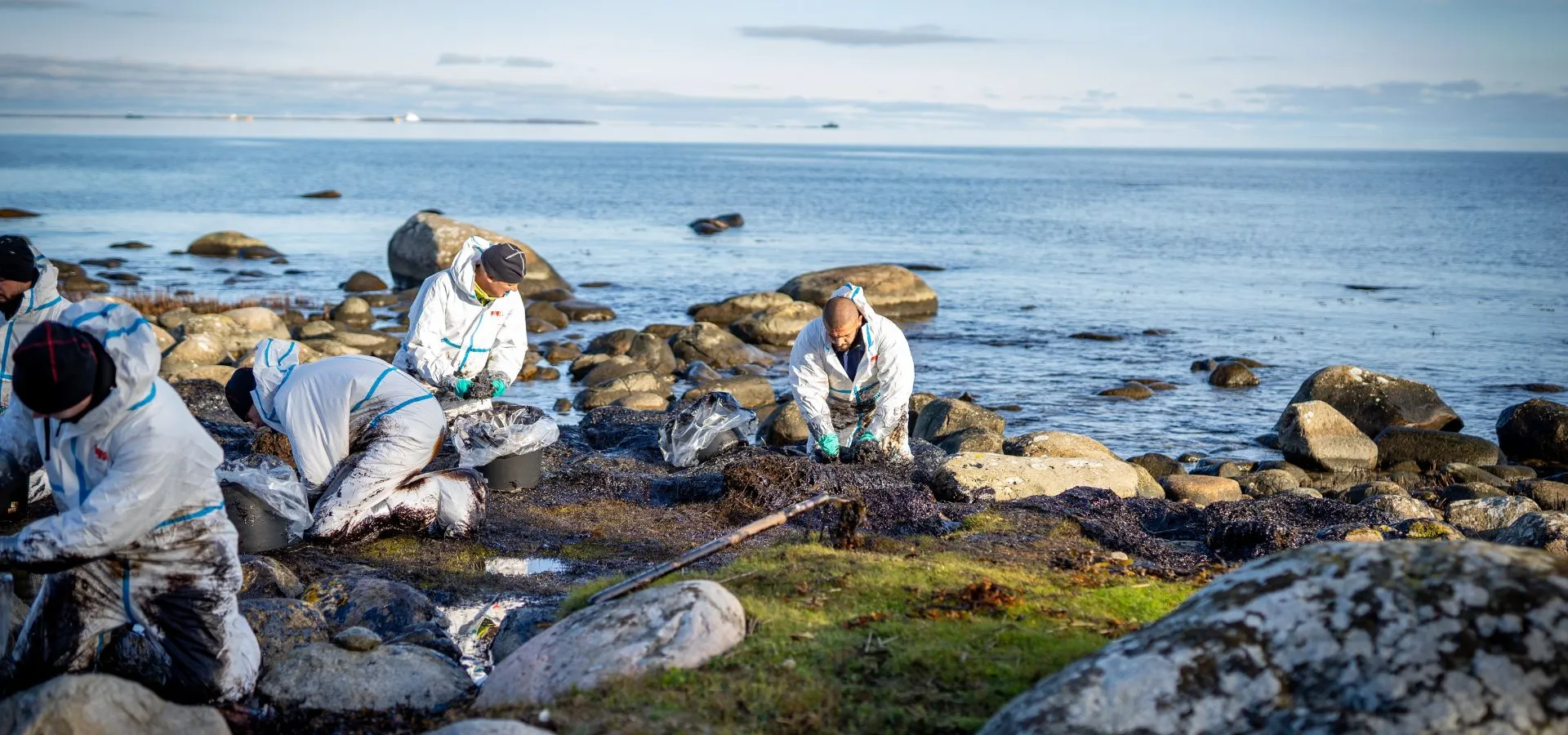Enormous commitment and good collaboration are bright spots in the challenging work.
Grief, worry, and anger, but also an immense amount of determination. The black coastline and the oil-damaged birds evoke strong emotions. Amidst all the negativity, it's hard not to feel warmth for what is happening in the aftermath of the disaster. Many want to help, both in the cleanup efforts and by providing financial support. The numerous initiatives and collaboration between national experts, authorities, local communities, and volunteers are impressive and uplifting. Many are working hard to clean, capture, and wash birds, ensure there is food, and manage other support services. Blekinge is rallying all possible forces to minimize the negative effects on the environment and wildlife.
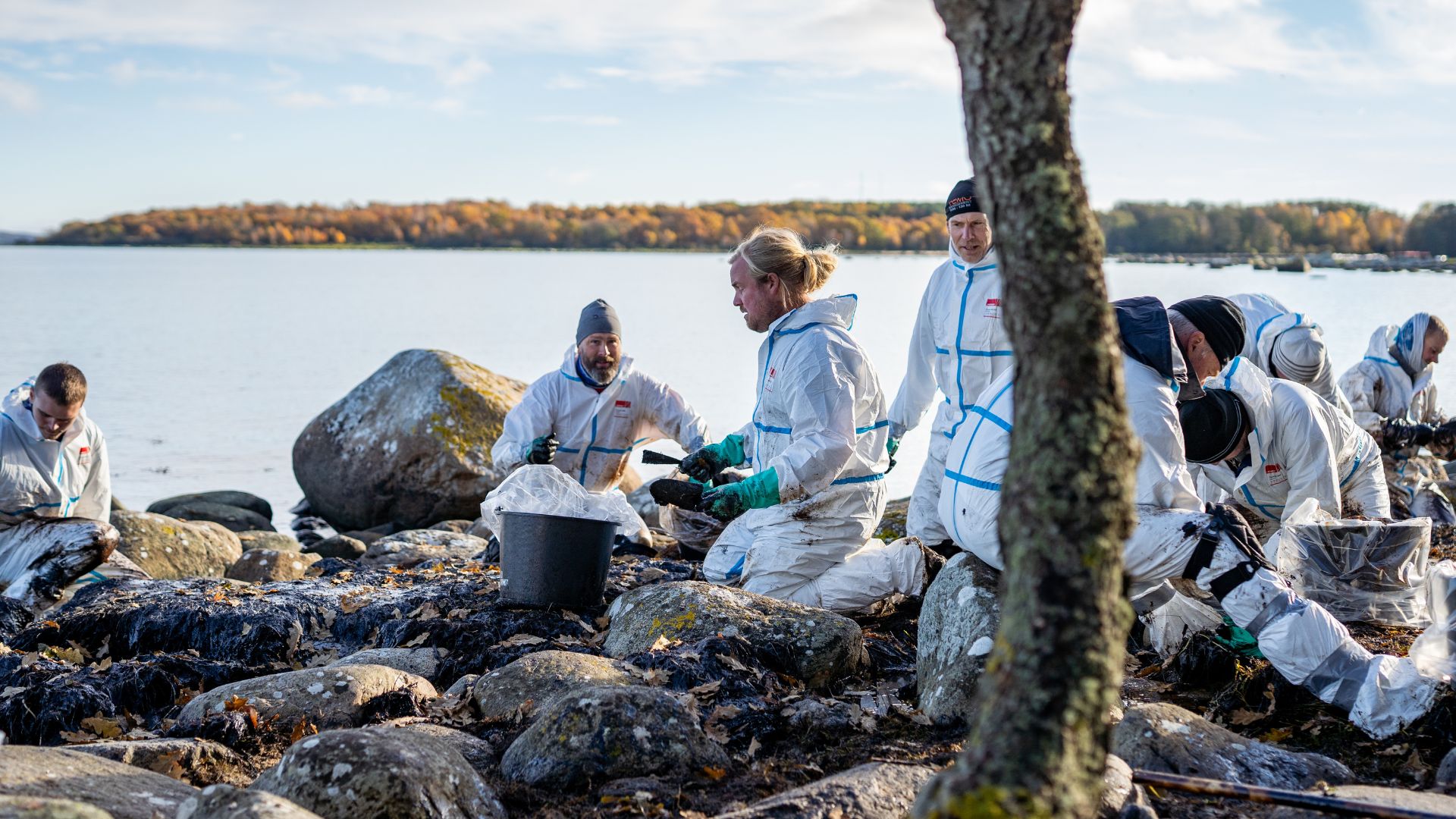
What Happened
Early on the morning of Sunday, October 22, TT-Lines passenger ship Marco Polo ran aground off the coast of Blekinge, causing a significant oil spill into the sea. The grounding in Pukaviksbukten resulted in a thick oil spill that has a severe impact on animals and nature along a coast known for its high natural values with sandy and rocky beaches and natural grazing areas. The ship remained in the waters outside Hörvik for a long time, and two more groundings, releasing even more thick oil, occurred before it was salvaged. The vessel was first towed to Stillerydshamnen and then to Gdansk (week 45). Intensive cleanup efforts have been underway since the very beginning.
Affected Area
The unique coastal stretch is part of the Blekinge Archipelago – a UNESCO-designated biosphere reserve. In Pukaviksbukten, there are important marine environments, what experts call "priority conservation values," especially the large areas of reefs crucial for several species. Reef environments with kelp belts are home to species like fish, crustaceans, mussels, bryozoans, and other organisms. Reefs are vital as reproduction and nursery areas for species such as herring, cod, and blue mussel. The shallower bays are significant areas for the reproduction of pike, perch, whitefish, and roach.
Blekinge's archipelago is a crucial location for our birds; species like lapwings, pochards, geese, and swans gather here before winter. Our entire coast is also a resting and migratory stop for hundreds of thousands of winged individuals heading towards warmer latitudes, such as seabirds, waders, and waterfowl. Diving and swimming ducks and waterfowl follow along the coast and in the archipelago, eagles and other birds of prey prefer to overwinter in the coastal regions of Blekinge.
The oil spill feels incredibly sad. Our coastal environments are already heavily affected by human activity, climate change, and eutrophication, and the oil certainly doesn't make it any better. Blekinge also has one of the most important areas in the Baltic Sea for porpoise. Here are also important species like blue mussels, bladderwrack, red algae, and eelgrass that will now face even tougher challenges," says Anothai Ekelund, marine biologist at the County Administrative Board of Blekinge.
Clenup Efforts
When an oil spill occurs in state waters, such as the sea, the Coast Guard is responsible for managing and collecting as much oil as possible. The municipality is responsible for the response when oil reaches the land, including our beaches and coastal areas.
Cleanup efforts to address the oil spilled in Pukaviksbukten began immediately after the accident. Several different work teams, including volunteers, representatives from organizations, the municipality, and authorities, have been working on the cleanup along the coast. The efforts are a collaboration primarily between the Coast Guard, the County Administrative Board, the affected municipalities, the Sea Rescue Society (SSRS), the Western Blekinge Fire Department, the Home Guard, and the Swedish Civil Contingencies Agency (MSB).
The exact amount of oil leaked from Marco Polo has not yet been determined. What is known is that the fuel tanks damaged during the grounding contained approximately 160 m3 of oil before the accident.
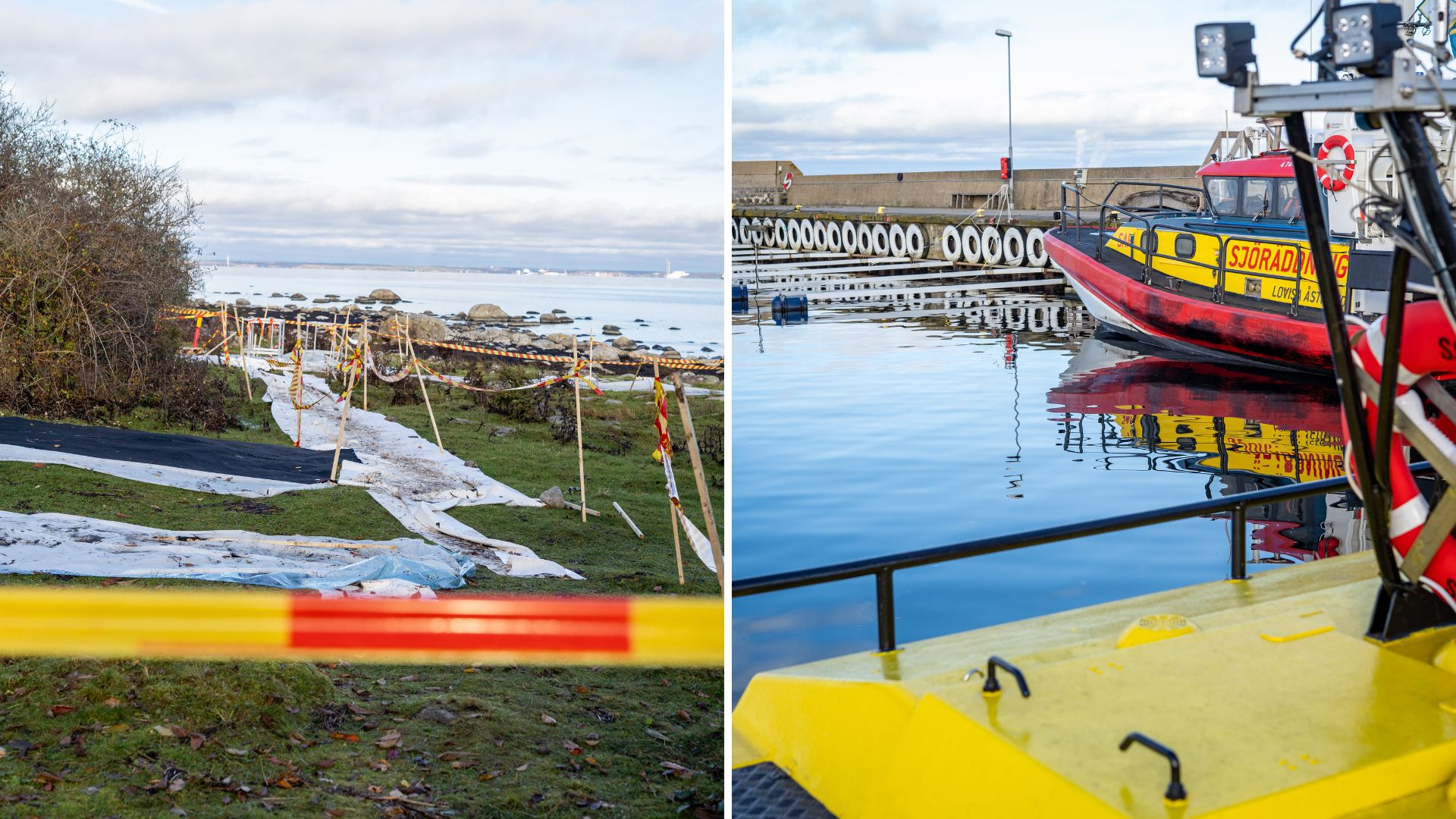
Oil-Affected Birds
The oil spill has a significant impact on the environment and wildlife. Oil-affected birds are collected, assessed, and washed, a task coordinated by local experts from the National Association for Disaster Relief for Birds and Wildlife with the help of the Swedish Blue Star and volunteers. To take care of the hundreds of oil-affected birds, Europe's largest bird washing station has been set up on Listerlandet. Several substantial donations have been directed towards providing more resources to the washing station and the rehabilitation of the rescued birds.
It is a time-consuming task because dealing with oil-affected birds cannot be rushed. Each wash requires up to 20 water changes and several meticulous steps with cleaning in rapeseed oil and detergent. Only when the water is completely clear is the bird considered washed, and then it is time for relocation, drying, followed by food and rest in an enclosure before being released at an oil-free location.
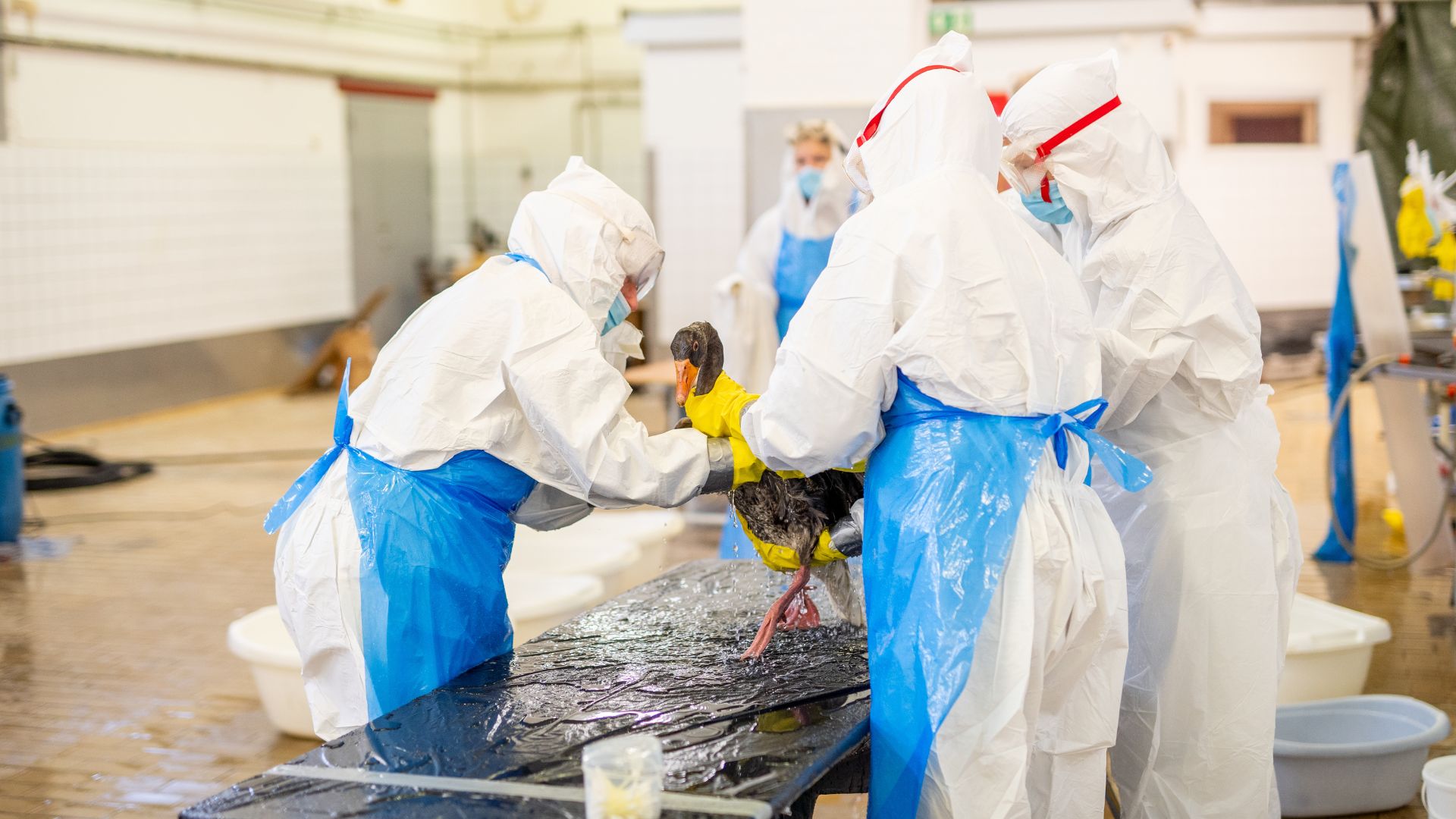
Stong Commitment - Significant Donations
Among the donations earmarked for bird rescue are 250,000 SEK from WWF, 100,000 SEK from Sparbanken Skåne, and 50,000 SEK each from the Sweden Rock Festival and the banks in Mjällby-Sölvesborg, Karlshamn, and Bromölla. Länsförsäkringar Blekinge contributes with 25,000 SEK, and the same amount goes to the SSRS station in Hörvik. The list of companies, organizations, and individuals contributing money is growing all the time.
The funds go directly to the local forces working on-site to capture and wash birds and to the teams cleaning and restoring the coast.
Restaurang Kajutan in Hörvik, Hotell Hanöhus, and Hälleviks camping are examples of businesses helping by providing food and offering free accommodation. Mention should also be made of the Hörvik-Krokås Local Heritage Association, which is doing a tremendous job coordinating efforts and ensuring that those dealing with the consequences of the oil spill are well taken care of.
The significant commitment shown by civil society, the public, and business owners is incredibly strong – and a prerequisite for our success. Everyone must collaborate and be patient because efforts will be needed for a long time to come.
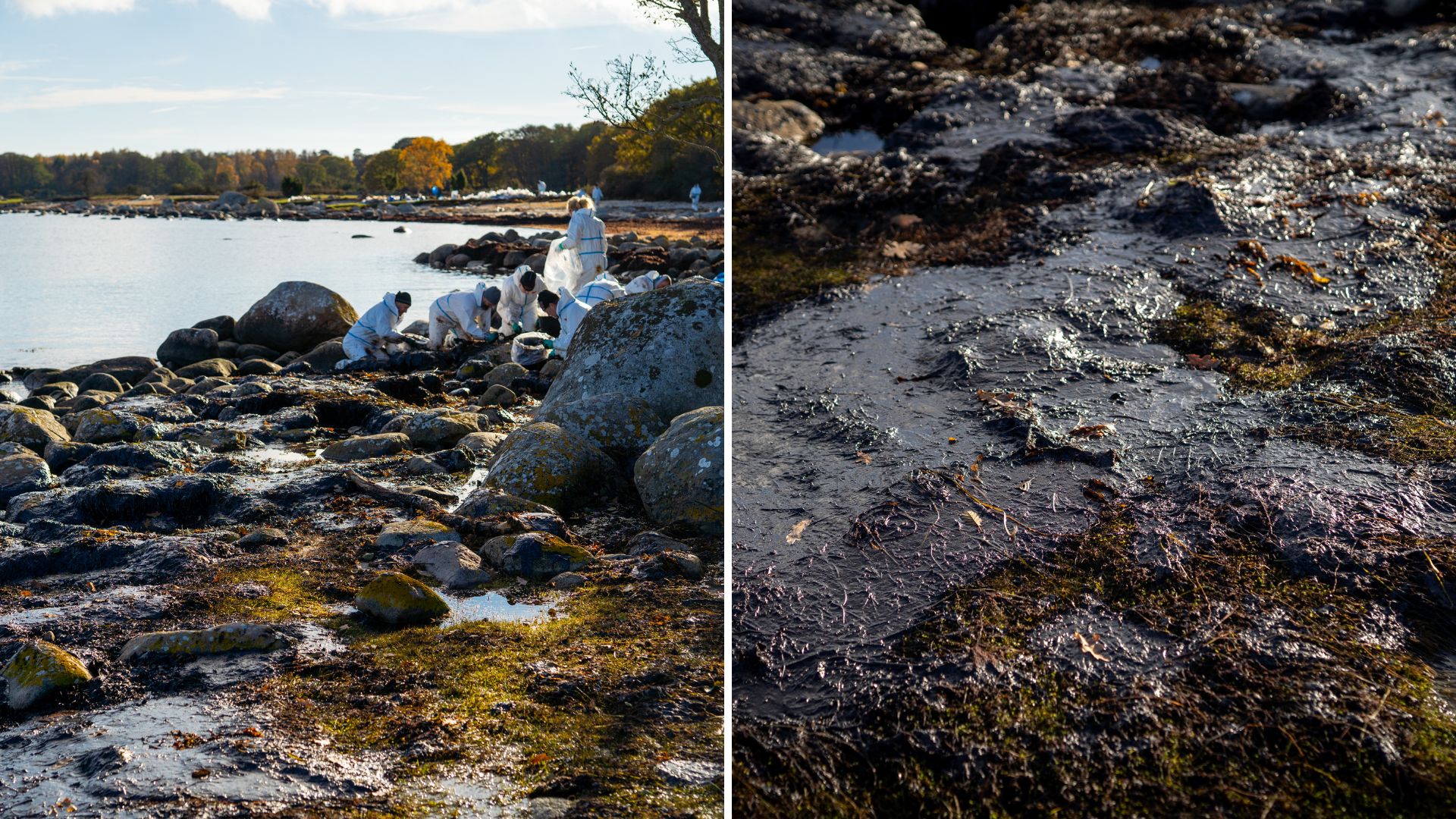
At Sea
Here, the Coast Guard is responsible for the cleanup efforts. To prevent the leaked oil from spreading, barriers are placed to contain the oil within a defined area. The oil is collected from the surface using brushes, pumps, and scoops, taken ashore, and delivered to special facilities for destruction. The SSRS and the Swedish Maritime Administration are also involved in the work of cleaning oil and removing the wrecked ship.
On Land
At the affected coastal strip, volunteers are tirelessly working to manually remove the oil. Meter by meter, stone by stone. They are clad in protective gear and meticulously tape their wrists and ankles as the oil is dangerous upon direct contact. They use tools such as knives and planting spades to hack away solidified oil. The ground is covered with white plastic to prevent further oil spread, and what is collected from stones and water edges is placed in buckets lined with garbage bags, then transported to a facility for destruction, just like the oil collected from the sea.
All volunteers must undergo training, approximately three hours, including a tour of the area. Incorrect methods pose a significant risk of volunteers causing more harm than good, exposing themselves to health hazards. Even though it may be challenging, it is crucial for the experts to listen to other experts.
Extent of Long-Term Damage
It is too early to determine the full negative impact of the oil spill in Pukaviksbukten on the environment and wildlife. However, it will be thoroughly assessed in various ways. The Environmental Association West conducts environmental monitoring in the area, including the annual bird nesting survey in and around Listershuvud. The County Administrative Board also conducts annual measurements here, providing data showing the conditions before and after the oil spill. In the follow-up work, the County Administrative Board collaborates with, among others, MSB (Swedish Civil Contingencies Agency), the Swedish Agency for Marine and Water Management, the Coast Guard, the Swedish Environmental Protection Agency, Sölvesborg Municipality, and Karlshamn Municipality. A comprehensive mapping of the consequences for animals and nature in the long term will also be conducted.

